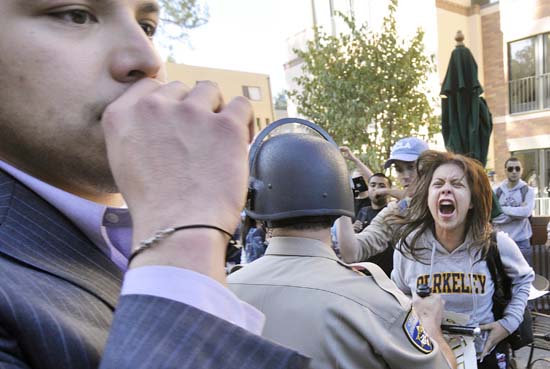
On Thursday, the UC Board of Regents approved the 32 percent increase in student fees and the budget plan that goes through 2011.
The board also agreed to reopen the Martin Luther King Jr. Hospital by the end of 2012, in partnership with Los Angeles County.
The increases will raise fees in January by 15 percent, or $585, for undergraduate students and 2.6 percent, or $111, for graduate students. For the 2009-2010 academic year, student fees for undergraduate resident students were scheduled to be a total of $7,788 and $8,736 for graduate students.
For the 2010-2011 academic year, both undergraduate and graduate
students will see an additional 15 percent fee hike of $1,334 and will
pay a total of $10,302 after the two-step increase is enacted.
“The master plan is in big trouble,” said UC President Mark Yudof,
regarding the fact that the University of California was founded to
provide an almost free education to state residents. “It’s absolutely
shameful,” he added.
Student Regent Jesse Bernal cast the only opposing vote on the
increases but approved the rest of the budget with the other regents.
In the midst of the fee increases, many regents said the deal with the
county regarding Martin Luther King Jr. Hospital was a moment to be
proud of. The partnership would create a private, nonprofit corporation
to run the hospital with funding from the county and physicians as well
as other medical personnel provided by the UC.
In addition to the roughly $400 million the county will spend on the
project, billionaire Dr. Patrick Soon-Shiong contributed a $100 million
line of credit to ensure the UC will not have to spend any money on the
venture.
The hospital would provide ambulatory services and inpatient care to a
South Los Angeles community of about 600,000 people who have been
without a hospital since 2007.
“When MLK closed, the community health clinics were flooded with
people, and it created a major problem,” said Yasser Aman, a UCLA
alumnus who runs a free clinic in the South L.A. area near MLK. “This
is both a health and human rights violation.”
The regents also discussed the possibility of making it a teaching
hospital in the future, and Aman reminded the regents that in 2003, MLK
was the most profitable teaching hospital in the country.
In addition to the approval of MLK hospital, the regents also expanded
the Blue and Gold Opportunity Plan in the budget proposal.
This plan previously ensured that students from families who earn less than $60,000 per year are completely covered by their financial aid packages. The ceiling for that program was raised to $70,000 at the regents meeting Thursday.
“If you make less than $70,000 a year, you will not pay any fees,” Yudof said.
Several regents expressed their aggravation with the state’s cuts to the UC budget. Gov. Arnold Schwarzenegger, who serves as an ex-officio member of the board, was in Los Angeles but did not attend the meeting.
Schwarzenegger was visiting Sixth Avenue Elementary School to comment on the Race to the Top Legislation, which could provide up to $700 million to the state’s K-12 schools if passed by the California State Assembly.
Andrea McCarthy, a representative from the governor’s office, said Schwarzenegger was aware of the significance of the regents’ vote.
“When it comes to the fee hikes, he knows that they are tough on students, and he encourages regents to look for other budget-balancing options,” McCarthy said.
After the morning meeting about MLK, the regents took a 45-minute recess. The meeting resumed with a public comment period, but there was not time for everyone to speak. The regents did not extend the public comment period, provoking the audience to chant and shout, “Whose university? Our university!”
Police filed in from outside the meeting to stand between the regents and the members of the public. However, when the public did not agree to be quiet, police proclaimed it an unlawful assembly and required them to leave.
The meeting resumed with second-year sociology student Ashley Williams, who spoke about her experience as someone who was in the foster care program and now attends UCLA.
Williams spoke about her involvement in organizing the Guardian Scholars Foster Youth Program at UCLA, which supports former foster youth now attending the university.
Her speech was in the context of a presentation by UC Vice President of Student Affairs Judy Sakaki on access to the UC and support programs available to former foster children.
“Fewer than 3 percent of the foster youth population at large ever graduate from college,” Sakaki said.
“For that reason, it is important to ensure their success at the UC,” she said.
